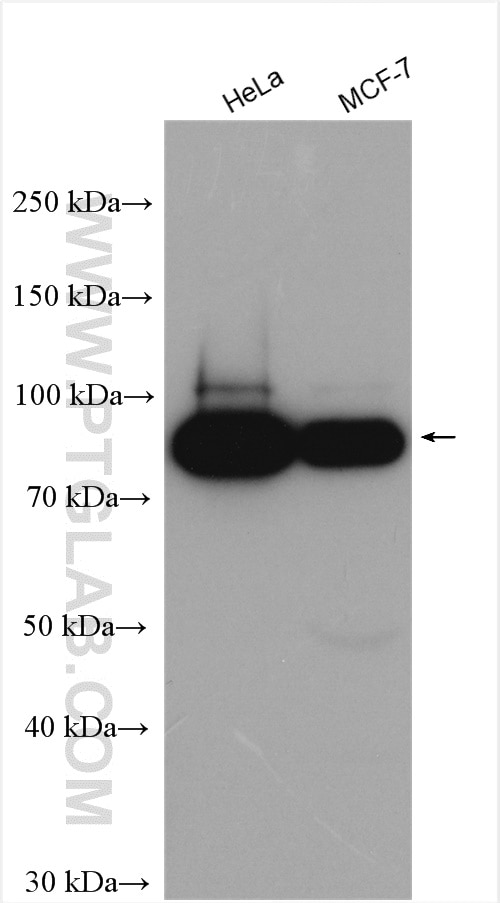Validation Data Gallery
Tested Applications
| Positive WB detected in | MCF-7 cells, HeLa cells |
Recommended dilution
| Application | Dilution |
|---|---|
| Western Blot (WB) | WB : 1:2000-1:10000 |
| It is recommended that this reagent should be titrated in each testing system to obtain optimal results. | |
| Sample-dependent, Check data in validation data gallery. | |
Product Information
14455-1-AP targets POLK in WB, ELISA applications and shows reactivity with human samples.
| Tested Reactivity | human |
| Host / Isotype | Rabbit / IgG |
| Class | Polyclonal |
| Type | Antibody |
| Immunogen |
CatNo: Ag6034 Product name: Recombinant human POLK protein Source: e coli.-derived, PGEX-4T Tag: GST Domain: 1-347 aa of BC050718 Sequence: MDSTKEKCDSYKDDLLLRMGLNDNKAGMEGLDKEKINKIIMEATKGSRFYGNELKKEKQVNQRIENMMQQKAQITSQQLRKAQLQVDRFAMELEQSRNLSNTIVHIDMDAFYAAVEMRDNPELKDKPIAVGSMSMLSTSNYHARRFGVRAAMPGFIAKRLCPQLIIVPPNFDKYRAVSKEVKEILADYDPNFMAMSLDEAYLNITKHLEERQNWPEDKRRYFIKMGSSVENDNPGKEVNKLSEHERSISPLLFEESPSDVQPPGDPFQVNFEEQNNPQILQNSVVFGTSAQEVVKEIRFRIEQKTTLTASAGIAPNTMLAKVCSDKNKPNGQYQILPNRQAVMDFIK 相同性解析による交差性が予測される生物種 |
| Full Name | polymerase (DNA directed) kappa |
| Calculated molecular weight | 99 kDa |
| Observed molecular weight | 70 kDa |
| GenBank accession number | BC050718 |
| Gene Symbol | POLK |
| Gene ID (NCBI) | 51426 |
| RRID | AB_2165839 |
| Conjugate | Unconjugated |
| Form | |
| Form | Liquid |
| Purification Method | Antigen affinity purification |
| UNIPROT ID | Q9UBT6 |
| Storage Buffer | PBS with 0.02% sodium azide and 50% glycerol{{ptg:BufferTemp}}7.3 |
| Storage Conditions | Store at -20°C. Stable for one year after shipment. Aliquoting is unnecessary for -20oC storage. |
Background Information
POLK, also named as DINB1, belongs to the DNA polymerase type-Y family. POLK is a DNA polymerase specifically involved in DNA repair. POLK Plays an important role in translesion synthesis, where the normal high-fidelity DNA polymerases cannot proceed and DNA synthesis stalls. Depending on the context, POLK inserts the correct base, but causes frequent base transitions, transversions and frameshifts. POLK is ubiquitously expressed in tissues, but is most abundant in testis, adrenal gland and ovary (PMID: 15661663). POLK has 8 isoforms with the molecular mass of 42-99 kDa.
Protocols
| Product Specific Protocols | |
|---|---|
| WB protocol for POLK antibody 14455-1-AP | Download protocol |
| Standard Protocols | |
|---|---|
| Click here to view our Standard Protocols |

